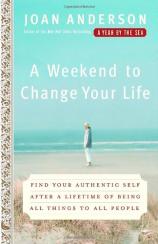Reading Group Guide
Discussion Questions
A Weekend to Change Your Life: Find Your Authentic Self After a Lifetime of Being All Things to All People

1. In the book’s introduction, Joan tells us “I was once so emptied by answering to everyone else’s needs and expectations that I was desperate. Simply showing up for life no longer sustained me.” How does the concept of “simply showing up for life” apply to you? What were your signs that this approach was no longer sustaining you?
2. Joan’s pre-weekend topics include the “Cluttered Calendar.” What patterns or themes did you uncover while sorting through the activities that depleted you, and choosing new indulgences that invigorate you? What do your favorite activities say about the person you were truly meant to be?
3. As you began the first Friday chapter, “The Importance of Retreat,” how did your definition of “retreat” shift? What did you most want to walk away from? What did you think you would be least likely to walk away from?
4. Which admired relative did you choose for the inspiration exercise? How did she assert her independence? What would she say to you now, if she were participating in the retreat with you?
5. As you studied your development through childhood pictures, did the images surprise you? How have other relatives responded to these photos and memories? Do their recollections of you match your recollections of yourself?
6. Joan Erikson became one of the author’s greatest teachers in the art of cultivating a fulfilling life. Who can serve as the Joan Erikson in your life? Whom would you like to mentor in these arts?
7. How did the Eriksons’ eight-stage life cycle compare to the milestones you were raised to expect? What strengths did you celebrate while weaving your life-cycle tapestry?
8. How did you react to the solitude of your Saturday sojourn? What did you discover about your mind and your body as you allowed yourself time to explore an open space, without an itinerary? Did nature greet you with a “welcome,” as the seals sometimes do for Joan’s beachcombers?
9. What was it like to write a letter to yourself capturing the process of this awakening? Did you find yourself using a particular tone or voice in the letter? Was your previous self-talk supportive and tender?
10. What areas of your life seemed the most challenging to match with the balance wheel in the Sunday Morning chapter? How did you meet the challenge? What areas of Self will receive renewed attention from you?
11. How many new directions did you uncover in the crossroads exercise? What habits, people, obligations, and emotions will you ditch in the process of exploring possibilities? When is the next retreat you have promised yourself? What transformations do you anticipate experiencing before then?
12. What were your impressions of the re-entry phase? How has your perspective on life changed? How have others’ perceptions of you changed?
13. Near the end of her Afterword, Joan writes that she worried about son’s “endurance runs” until she experienced one with him. “It’s the hard that makes it great,” he tells her. What is the best way to distinguish between hard challenges that harm us and hard challenges that help us fulfill our potential?
14. How do women’s lives generally differ from men’s? Why do so many women find it unimportant to care for themselves, though they go to extraordinary measures to care for others? What can turn this tide?
A Weekend to Change Your Life: Find Your Authentic Self After a Lifetime of Being All Things to All People
- Publication Date: April 10, 2007
- Paperback: 272 pages
- Publisher: Three Rivers Press
- ISBN-10: 0767920554
- ISBN-13: 9780767920551







